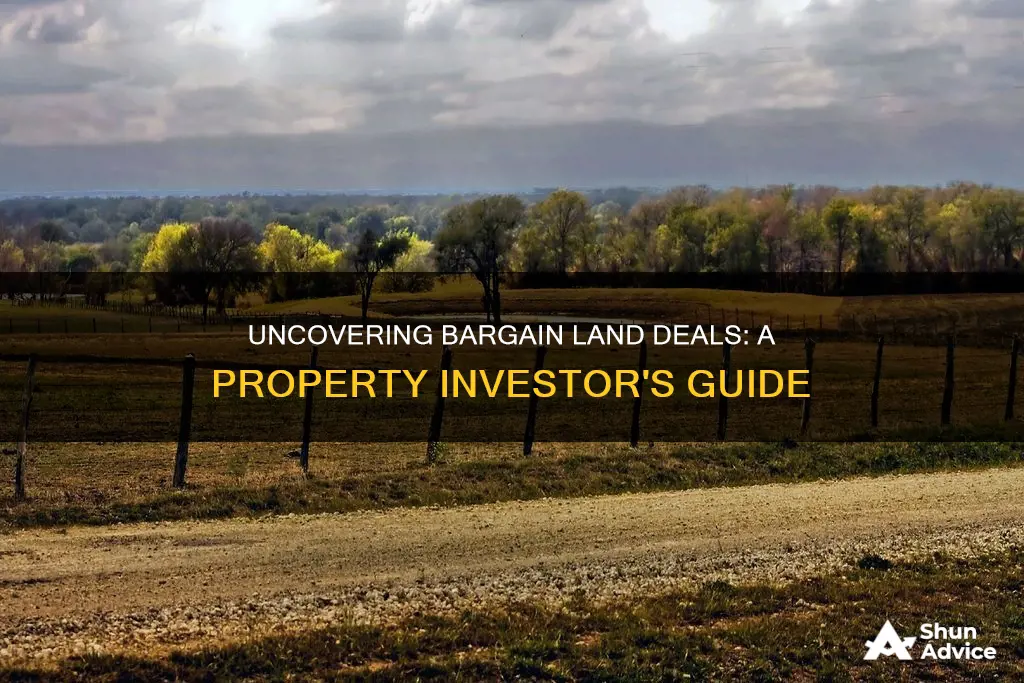
Investing in land is a great way to diversify your portfolio and make good profits. Land investments offer better returns at lower risks compared to other investments. The demand for land is consistently high due to the increasing population and ongoing infrastructure developments, and its value usually increases over time, making it a good hedge against inflation.
There are a few things to keep in mind when investing in land. Firstly, do your research on the location and its potential for growth. Consider the region's closeness to urban areas, infrastructure development, and the presence of essential amenities. Secondly, be aware of the different types of land investments, such as commercial, residential, row crop, and livestock land. Each type has its own set of considerations and requirements. Thirdly, investing in land requires patience and a long-term strategy. Raw land, in particular, may take a while to appreciate and generate returns. Finally, don't underestimate the importance of due diligence. Understand the zoning regulations, access to utilities, property taxes, and any potential issues with the land.
Overall, investing in land can be a wise decision, but it requires careful consideration and a long-term commitment.
What You'll Learn

How to find cheap land
There are several ways to find cheap land for investment. Here are some strategies and tools to help you in your search:
Online Research
Start by conducting online research to identify potential areas or locations where you want to buy land. Compare prices, payment plans, and your budget. You can also utilise listing sites to find low-priced land that has been on the market for a while. Additionally, consider using online platforms that specialise in offering cheap land, such as CheapLands.com, which provides a variety of affordable real estate properties.
Consult Specialists
If your research requires specialist knowledge, consider hiring professionals such as a land surveyor, title company, or appraiser to assist you in your search. They can provide valuable insights and ensure that you make a well-informed decision.
County Ownership Plat Book
Each county makes real estate ownership data available to private mapping companies, which then create maps (known as plat maps or plat books) detailing land ownership within the county. These books typically include property boundaries, owner names, acreage, roads, and township section numbers. Plat maps are essential for understanding how the desired property is divided, its boundaries, and the surrounding areas. You can usually find these books for sale at county courthouse offices or online for $25 to $80.
Maps
Having a collection of maps of your desired area is beneficial. While paper maps used to be the norm, online maps are now readily available and offer powerful search tools, advanced filtering, and tagging options. County highway maps, for example, are often provided by state Departments of Transportation and include roads, towns, cities, and the Public Land Survey System (PLSS) grid, making them a great starting point for your search.
Another useful map type is the U.S.G.S. 7.5-minute Topography Map, which is known for its accuracy and beauty. These maps are widely used in the real estate industry and can be found online at https://store.usgs.gov/. Google Earth is another powerful tool that provides aerial photography, allowing you to zoom, measure property, and define boundaries accurately.
County Assessor's Office
The County Assessor's Office keeps track of land ownership for property tax assessment purposes. Visit this office to obtain the names and addresses of landowners in your desired area, especially those with out-of-area addresses. This information will help you identify potential properties that meet your criteria.
FSBO (For Sale by Owner) Properties
Instead of relying solely on real estate agents, consider searching for "cheap land for sale near me by owner". Buying directly from the landowner (also known as FSBO) can save you real estate commission fees, typically ranging from 4% to 6% of the land price. This can result in significant savings, allowing you to purchase larger acreage or negotiate a better deal. Additionally, negotiating directly with the seller can streamline the process and lead to a more equitable agreement.
Rent-to-Own Model
Although more commonly used for homes, the rent-to-own model can also be applied to vacant land. With this approach, a portion of the rent you pay goes towards eventually purchasing the property. This allows you to try out the land and get a feel for the neighbourhood before committing to a purchase.
Airlines: Where to Invest Now
You may want to see also

The benefits of investing in land
Land is a finite resource, and as Mark Twain famously said, "they aren't making it anymore". With this in mind, here are some reasons why investing in land is a good idea.
Low Maintenance
Vacant land requires minimal work compared to other properties. You can leave the land as it is, or install fencing for security. It's a hands-off investment that doesn't come with the usual headaches of being a landlord, such as dealing with tenants, repairs, and maintenance.
Long-Term Appreciation
Land is a tangible asset that tends to appreciate over time. It is a stable, long-term investment that is less susceptible to market fluctuations. The value of land is also less likely to be impacted by external factors, such as theft or damage.
Passive Income
Leasing out land is a great way to generate passive income. You can lease it for agricultural, recreational, commercial, or warehousing purposes, providing a steady income stream without the stress of active involvement.
Affordable
Vacant land is often more affordable than developed land, making it a great entry point into the real estate market. It also comes with lower insurance rates, property taxes, and maintenance costs.
Low Competition
There is less competition for buying land compared to other real estate investments. While others focus on developments, condos, and house flipping, investing in land can be a shrewd move, allowing you to acquire property without burning a hole in your pocket.
Flexible Opportunities
Land offers a wide range of flexible opportunities. You can build a family house, a retail unit, or even create your own dirt bike track! It's a versatile investment that can be tailored to your needs and desires.
Secure Retirement
Leasing out land can provide a steady income stream during retirement. It is a safe and stress-free way to generate passive income, as it requires minimal maintenance and continues to appreciate over time.
Peace of Mind
Land is a long-term, tangible asset that doesn't depreciate or wear out. It provides financial security and peace of mind, knowing that your investment is safe and will likely increase in value.
Limited Supply
With a growing population and limited land availability, the demand for land will always be high. This ensures that your investment remains valuable and sought-after.
Simple Process
Purchasing land is often simpler than people think. The process can be completed remotely, and there are no complex legislative requirements to navigate.
Diversification
Investing in land is a great way to diversify your investment portfolio. It can help reduce risks and provide long-term gains, especially in the current economic climate.
Low Property Tax
Property tax for land is typically much lower than for developed properties, resulting in significant financial savings for landowners.
High Resale Value
Land appreciates faster than built-up properties. This is because land is immune to external factors such as erosion and weather conditions, ensuring that its value remains stable or increases over time.
No Legal Issues
In the US, there are generally no risky government laws to worry about when purchasing land. Thanks to the Dodd-Frank Act and the Secure and Fair Enforcement for Mortgage Licensing Act, you can invest in land without the need for costly legal assistance.
Market Recovery: When Will Investments Rebound?
You may want to see also

How to make money from cheap land
Investing in land is a great way to make money, offering higher returns at lower risks. Here are some ways to make money from cheap land:
- Sell the land: The simplest way to make money from land is to sell it, especially if the land value has increased since you bought it.
- Lease the land: You can lease the land to businesses or individuals on a monthly or yearly basis. This can provide a steady income without having to do much.
- Subdivide the land: You can divide a single plot of land into several smaller plots and sell them individually. This can increase the overall value of your investment, as smaller plots are often more marketable and affordable for buyers.
- Develop the land: Depending on the location and zoning regulations, you can develop the land for residential, commercial, or agricultural use. This can increase the value of the land and provide multiple revenue streams.
- Buy and hold: Historically, land values have appreciated over time. Therefore, buying and holding onto undeveloped land can result in viable returns, especially in the long term.
- Agriculture: You can use the land to grow crops, raise livestock, or lease it to farmers.
- Storage: You can also use the land for storage, such as boat storage, and charge a fee for this service.
- Events: If your land is in an attractive location, you can rent it out for events or festivals.
When investing in cheap land, it's important to do your research and due diligence. Consider the location, zoning regulations, access to utilities, and potential for development. Additionally, make sure you have the financial means to purchase the land and any necessary funds for development or maintenance.
The Green Rush: Exploring Corporate Interests in Marijuana
You may want to see also

The risks of investing in land
Investing in land can be a lucrative endeavour, but it is not without its risks. Here are some of the potential risks associated with investing in land:
Zoning Restrictions
Zoning regulations dictate how land can be used and developed. For example, land in a commercial zone cannot be used for residential purposes without petitioning for reclassification, which can be a costly process. Understanding the zoning laws for the area is crucial before investing in land.
Environmental Concerns
Contamination from previous industrial, commercial, or agricultural activities can be an issue, especially for vacant commercial land. Additionally, conservation easements, the presence of protected wildlife, or the existence of creeks, streams, or other waterways may restrict development.
Market Volatility
The value of land is heavily influenced by market conditions and trends. Economic downturns, changes in industry demand, or other external factors can significantly impact land prices and potential profitability.
Limited Utilities
In rural areas, access to public utilities such as water, electricity, or sewage systems may be limited or costly to install and maintain, making development or resale less desirable.
Environmental Factors
Rural areas may be more prone to natural disasters such as floods, wildfires, or earthquakes. It is essential to research the history of the land and any potential environmental hazards before investing.
Maintenance Costs
Owning vacant land, especially in rural areas, incurs regular maintenance costs, such as mowing grass, clearing debris, and maintaining fences. These expenses can add up over time and should be factored into calculations of potential profitability.
Accessibility
Limited road access, difficult terrain, or the absence of necessary utilities can hinder development and impact the success of any projects.
Illiquidity
Land can be challenging to convert into cash quickly, and it may take months or even years to find a suitable buyer, making it a relatively illiquid asset.
High Upfront Costs
Investing in land often requires significant upfront costs, including the purchase price, taxes, finance charges, and development expenses.
Encroachment and Acquisition
There is a risk of encroachment or compulsory acquisition by the government, which can jeopardise your legal rights over the land and result in litigation and unexpected legal costs.
Non-availability of Finance
Banks and lenders typically view land as a "speculative investment" and may not approve loans for land purchases, especially if there are no immediate plans for development.
Property History
It is essential to research the history of the property to identify any potential issues, such as previous contamination or environmental concerns, that could impact the value and usability of the land.
Invest Now: Where to Put Your Money
You may want to see also

How to buy land with no money
While it is possible to buy land with no money, it is important to note that it may take longer than expected. Here are some strategies to consider:
- Listings Sites: The simplest way to find low-priced land is by using listing sites. Many sites offer the option to buy land that has not been sold for over a year. It is also recommended to work with a reputable private land seller to access listings that go very quickly.
- Financing Options: Look out for financing options when getting a deal and understand the necessities. You can also ask for property access or request a delayed closing to save funds to purchase the land.
- Real Estate Investment Trusts (REITs): REITs are companies that allow multiple investors to pool their financial resources to invest in real estate properties. They are a good source of passive income and provide liquidity, allowing investors to buy and sell easily.
- Seller Financing: This involves negotiating an agreement between the investor and the seller regarding payment terms, interest rates, consequences of default, and repayment timelines.
- USDA or VA Loans: The United States government offers loans for eligible buyers to purchase land and build on it in remote areas. USDA loans encourage people to own homes and tracks of land for farming, while VA loans are for military personnel.
- Tax-Defaulted Properties: These are properties that have been confiscated by the county treasurer due to defaulted taxes and are sold at auction, often at discounts of 60%, 70%, or 80% below the tax-assessed value.
- Partnerships: Consider finding a partner who can invest funds in exchange for your time and property management skills. You can also join forces with multiple investors to accumulate the necessary funds for purchasing property.
- Microloans and Hard Money Lenders: Microloans are small sums borrowed from a single or multiple lenders to start a new business or grow a startup. Hard money lenders are private lenders who provide short-term loans for real estate investments, often with fewer requirements and higher interest rates.
- Real Estate Crowdfunding: This involves investing in real estate properties with other investors through online platforms. It allows you to add properties to your portfolio without a huge investment.
- Special US Government Schemes and Loans: The USDA offers mortgages with 0% down payment for suburban or rural homebuyers with moderate or low-income levels. Additionally, veteran benefits in many states include no money down or no state taxes, which can offset the down payment over time.
Eth Investment: Right Move Now?
You may want to see also
Frequently asked questions
Investing in land is a good way to diversify your portfolio and make good profits. Land investments offer better returns at lower risks compared to other investments. They are also less competitive and require minimal maintenance.
Investing in land can be illiquid, i.e., difficult to convert into cash when needed. It also comes with management responsibilities such as upkeep, tax management, land-use decisions, security, and utility management.
Here are some tips for buying cheap land:
- Look for land listing sites that offer low-priced land that has not been sold for over a year.
- Check zoning ordinances to ensure you can build on the land.
- Assess the soil type, number of trees, and terrain elevation/flatness, as these factors will affect building costs.
- Research environmental dangers such as flooding and natural disasters, as well as any endangered plants or animals on the property.
- Ensure you have legal access to the land via roads, which may require an easement agreement with neighbouring landowners.
- Check if the land has access to utilities like city water, electricity, cable lines, and sewage systems.
- Consult a real estate agent to help you navigate the process and find suitable properties.







